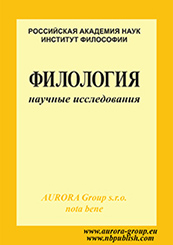Translation
Reference:
Yang, C. (2025). Titles of Traditional Chinese Musical Instruments in Russian Concert Posters : Methods of Formal and Semantic Adaptation. Philology: scientific researches, 5, 1–15. https://doi.org/10.7256/2454-0749.2025.5.73729
Abstract:
In recent years, cultural ties between different nations have been expanding. Concerts of Chinese national music are often held in Russian cities. Posters are distributed both through traditional methods and online. The question arises about which linguistic means allow Russian-speaking readers to learn about a new cultural experience and to make the description of Chinese musical tradition understandable and appealing. The subject of this study is the examination of the ways information about musical instruments that are exotic for the Russian culture is conveyed. It investigates the reasons for choosing lexical units to denote the instruments, as well as the formal and semantic adaptation pathways of borrowed lexemes in the Russian language. The material consists of vocabulary naming Chinese national instruments in concert posters written in Russian. The material was collected through a method of continuous sampling. Lexicographic, comparative, and statistical methods were used in the analysis. The article presents an analysis from different perspectives: it explores the types of conveying the sound of Chinese musical terms in Russian, searches for equivalents in Russian musical terminology, and examines the connotation of the titles of Chinese concerts. The novelty of the approach lies in the choice of material. Involving concert posters of Chinese national music allowed for a comprehensive analysis based on musicology and linguistics data. The investigation of the text and visual elements of the concert poster allowed for the following conclusions: the pragmatics of the national music concert poster lies in the fact that the text and visual elements not only convey precise information about the concert but also invite a wide audience of music lovers, arousing interest among Russian listeners. The names of Chinese instruments are given in transcription according to the Pallady system, and the processes of Russification are presented minimally. Units that, according to dictionaries, inflect, may appear in posters as uninflected, which also indicates the absence of Russification. The use of inaccurate equivalents for interpreting the meanings of exoticisms provides listeners with a general idea of the instrument but does not allow for a comprehensive and in-depth understanding of the character of the music being performed.
Keywords:
calque, interpretation, exoticism, Russification, borrowing, musical terminology, non-equivalent vocabulary, transliteration, transcription, connotation
Translation
Reference:
Latiypova, Y.A., Absalyamova, L.F., Hisamova , D.D., Mingazetdinova, R.F. (2025). The study of the concept in the context of cognitive linguistics (using the example of the concept "will" in Russian). Philology: scientific researches, 5, 16–30. https://doi.org/10.7256/2454-0749.2025.5.72879
Abstract:
The object of research in this article is a concept in the aspect of cognitive linguistics. In the middle of the last century, a cognitive field appeared in science, which unites many scientific disciplines. Cognitive science explores the human mind, its thinking abilities, consciousness, memory, etc. Language is used by humans not just to exchange information, it structures knowledge about the world. The concept is a basic concept of cognitive linguistics, combining language, consciousness and culture. The purpose of this article is to study the content of the concept and build its cognitive model using the example of the concept of "will", which will reveal the ways of structuring knowledge about the world, as well as the ways of their evolution. The methodology of conceptual analysis is based on the study of the meanings of words and expressions that actualize the concept in the language. Etymological analysis makes it possible to identify the central image of the concept, around which conceptual meanings are layered. The study of the concept of "will" in cognitive linguistics makes a significant contribution to understanding the interaction of language, thinking and culture, as well as to the development of methods for analyzing linguistic and cultural concepts. This study for the first time combines the analysis of the historical development of the concept with its cognitive structures such as metaphors, frames and prototypes, which allows us to create a comprehensive understanding of the concept of "will" in the Russian language. A comprehensive study of the ways and means of lexical expression of the concept of "will" reveals the conceptual content. All of the above determines the relevance of this article. The research results can be used in cognitive linguistics, psychology, and philosophy of language.
Keywords:
meaning, anthropocentrism, conceptualization, the cognitive metaphor, metaphor, the frame, cognition, cognitive linguistics, conceptual feature, concept
Semantics
Reference:
Zhao, P. (2025). Structural and semantic features of occasionalisms in the example of the novel "Lavr" by E.G. Vodolazkin. Philology: scientific researches, 5, 31–41. https://doi.org/10.7256/2454-0749.2025.5.74352
Abstract:
The article is dedicated to the analysis of occasionalisms in E.G. Vodolazkin's novel "Lavr" as a key element of the author's idiolect, representing the religious-philosophical discourse through the synthesis of archaic and postmodern linguistic strategies. The object of the study is the occasionalisms in E.G. Vodolazkin's novel "Lavr" as a linguopoetic phenomenon, while the subject of the research is their structural-semantic features and functional role in constructing the religious-philosophical discourse. The aim of the study is to identify the structural-semantic characteristics of occasional units, their role in the architecture of the text, and the transmission of worldview attitudes, which allows uncovering the mechanisms of language transformation into a tool of theological reflection. The key focus is on the multi-level classification of occasionalisms, revealing their systemic interaction: lexical-semantic (recontextualization, for example, "twofoldness"), morphological (archaic suffixes — "Rukinets"), syntactic (violation of agreement norms), and graphic (metatextual markers, for example, parentheses). The methodology combines linguistic-stylistic analysis of word formation models, taxonomies of occasionalisms based on N.G. Babenko's criteria with the addition of graphic types, as well as the interpretation of linguistic neologisms in the context of religious symbolism. The scientific novelty of the work lies in the interpretation of linguistic deformation as a mechanism of philosophical modeling, where occasionalisms transform the text into a space for dialogue between the material and the spiritual ("woodenness" as a symbol of asceticism), the historical and the eternal (allusions to the martyr canon of Trifon), language and metaphysics (the wordplay "kalachnik/kulachnik" as semantic deconstruction). During the study, it was established that occasionalisms perform a dual function: archaization (for example, "theologize," "child-loving") links the text to the church tradition, while neologization ("spiritual fall," "time counting") actualizes philosophical themes — eternity, metamorphosis, transcendence. The conclusions emphasize that the synthesis of tradition and innovation in occasionalisms forms the unique idiolect of E.G. Vodolazkin, where the language game becomes a tool for reflection on existential boundaries and opens up new perspectives for interdisciplinary dialogue between linguistics, theology, and cultural anthropology in contemporary prose.
Keywords:
postmodern poetics, neo-hagiography, structural-semantic analysis, interdisciplinary studies, religious-philosophical discourse, language game, authorial style, graphic occasionalism, semantic occasionalism, occasionalisms
 This work is licensed under a Creative Commons Attribution-NonCommercial 4.0 International License.
This work is licensed under a Creative Commons Attribution-NonCommercial 4.0 International License.











 © 1998 – 2025 Nota Bene. Publishing Technologies. NB-Media Ltd.
© 1998 – 2025 Nota Bene. Publishing Technologies. NB-Media Ltd.




